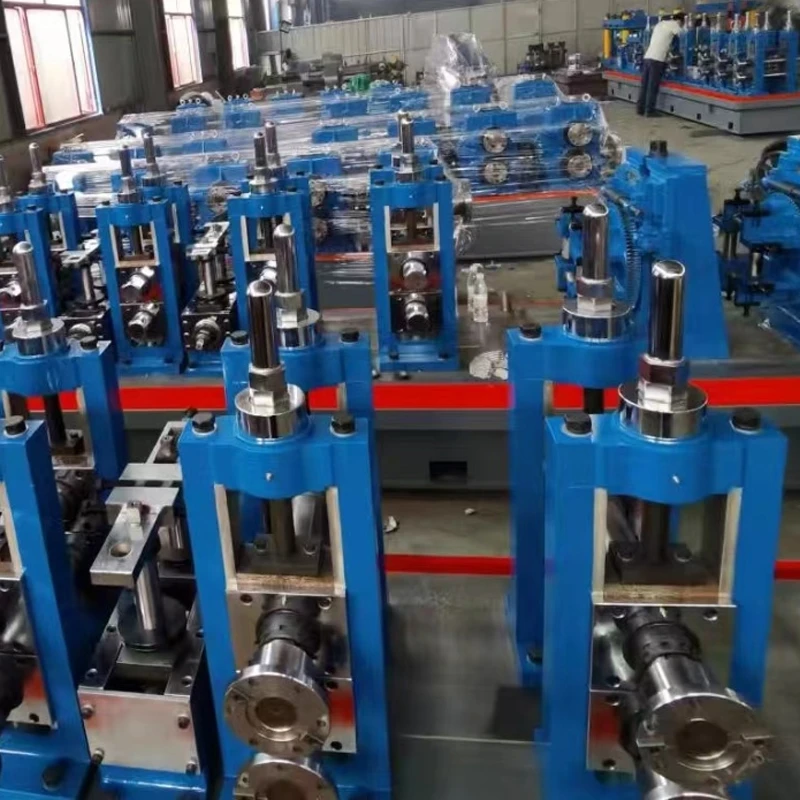roll forming roller material
The Importance of Roller Material in Roll Forming Processes
Roll forming is a widely used manufacturing process that involves the continuous bending and shaping of metal sheets into a desired cross-sectional profile. This process relies heavily on the use of rollers, which come into direct contact with the material being shaped. The choice of roller material is crucial as it affects the efficiency, quality, and durability of the roll forming process. In this article, we’ll explore the various materials used for roll forming rollers and their impact on production.
Common Roller Materials
1. Steel Alloys Steel is one of the most common materials used for manufacturing rollers due to its strength and durability. Different grades of steel alloys can be used depending on the application. For instance, high-carbon steel is frequently utilized for its hardness, while stainless steel offers resistance to corrosion, making it suitable for environments where rust is a concern. Often, steel rollers are treated through processes like heat treatment and hardening to increase their surface hardness and wear resistance.
2. Nickel Alloys Nickel alloys are often used in high-temperature applications because of their excellent mechanical properties and resistance to oxidation. These materials can withstand significant thermal fluctuations, making them ideal for processes that involve heating and cooling cycles. While nickel alloys can be more expensive, their longevity and performance can justify the initial investment.
3. Polymer Composites In certain applications, particularly where the material being shaped is sensitive to deformation, polymer composites are utilized. These materials can offer a softer contact surface that reduces the risk of marking or damaging the finished product. Moreover, polymer rollers are often lighter than metal ones, reducing the overall weight of the roll forming setup. However, they may not be suitable for heavier-duty applications due to their lower resistance to wear and tear.
4. Ceramic Materials For specific applications that require extreme hardness and wear resistance, ceramic materials may be considered. Although they can be brittle and less flexible than metal rollers, ceramics excel in environments where heat and corrosion resistance are paramount. Their application is generally limited, but they serve a vital role in niche industries.
Factors Influencing Roller Material Selection
roll forming roller material

When selecting roller material for roll forming, several factors come into play
- Material Properties Hardness, tensile strength, and resistance to wear and deformation are critical for ensuring that rollers can withstand continuous use without degrading quickly.
- Cost The budget for the manufacturing process plays a significant role in material choice. Premium materials can enhance performance but may also lead to higher production costs.
- Production Volume and Frequency High-volume production runs may justify the use of more durable materials, while smaller, less frequent tasks may benefit from less expensive options.
- Temperature Resistance If the roll forming process involves heating, the thermal properties of the roller material become crucial. Materials must be selected to handle the heat without losing structural integrity.
Conclusion
The material used for roll forming rollers significantly impacts the manufacturing process's efficiency and quality. Whether opting for steel alloys for their strength, nickel alloys for their high-temperature performance, polymers for their softness, or ceramics for their extreme hardness, each material has its unique advantages and disadvantages. Ultimately, the decision should be based on a detailed understanding of the specific requirements of the roll forming project, balancing performance, cost, and durability. Investing in the right roller material can enhance the overall productivity of the roll forming operation, leading to better quality products and a more profitable manufacturing process.
-
High Frequency Straight Seam Welded Pipe Production Line-BzZhou Xinghua Machinery Equipment Manufacturing Co., LTD.|line pipe steel&welded gas pipeNewsJul.30,2025
-
High Frequency Straight Seam Welded Pipe Production Line-BzZhou Xinghua Machinery Equipment Manufacturing Co., LTD.|High Precision&Automated SolutionsNewsJul.30,2025
-
High Frequency Straight Seam Welded Pipe Production Line - BzZhou Xinghua Machinery Equipment Manufacturing Co., Ltd.NewsJul.30,2025
-
High Frequency Straight Seam Welded Pipe Production Line-BzZhou Xinghua Machinery Equipment Manufacturing Co., LTD.|Precision Welding, High EfficiencyNewsJul.30,2025
-
High Frequency Straight Seam Welded Pipe Production Line|BzZhou Xinghua|Precision Welding&EfficiencyNewsJul.30,2025
-
High Frequency Straight Seam Welded Pipe Production Line - BzZhou Xinghua|Precision Engineering&EfficiencyNewsJul.30,2025


